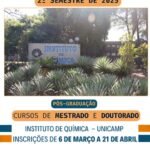Electrocatalysis at nanostructured interfaces for biomass upgrading
Palestrante: Prof. Dr. Yaovi Holade – Institut Européen des Membranes (IEM, UMR) – Univ. Montpellier – França
Abstract: Electrosynthesis is emerging as a green approach with low environmental impact compared to other homo(hetero)geneous catalysis. Applied to cellulosic biomass, electrosynthesis is a powerful tool for the production of commodity renewable chemicals. In particular, H2’s electrolyzers should enable sustainable and permanent storage of electricity compared to batteries and intermittent devices (solar, wind…). However, nearly 90% of the electricity input is consumed by the oxygen evolution reaction (OER) due to its high potential leading to 53 kWh/(kg(H2)), i.e. 8-10 € per kg of H2, 2-5 times higher than the UE & US DOE targets for 2020-2030/2050. Therefore, deciphering the complex electrooxidation of abundant biomass organics could be a solution to lower the energy input due to their low oxidation potential, in addition to the co-generation of value-added organics.1 However, the cellulosic biomass-based H2 production electrolyzers are still in their infancy due to the limited access to suitable electrocatalysts to fix the unsolved control of selectivity at high current density. In this talk, after a brief review of the current state of knowledge, I will present the results of my group’s efforts to decode the selective electroreforming of biomass-based organics, considering both anode and cathode coupling scenarios. I will also discuss how to develop a fairer basis for evaluating electrocatalytic performance,2,3 arguably the starting-point in an electrochemistry lab.References: 1. Holade, Y.; Tuleushova, N.; Tingry, S.; Servat, K.; Napporn, T. W.; Guesmi, H.; Cornu, D.; Kokoh, K. B., Recent advances in the electrooxidation of biomass-based organic molecules for energy, chemicals and hydrogen production. Catalysis Science & Technology 2020, 10 (10), 3071-3112; 2.Wang, Q.; Guesmi, H.; Tingry, S.; Cornu, D.; Holade, Y.; Minteer, S. D., Unveiling the pitfalls of comparing oxygen reduction reaction kinetic data for Pd-based electrocatalysts without the experimental conditions of the current–potential curves. ACS Energy Letters 2022, 7 (3), 952-957; 3.Holade, Y.; Ghosh, S.; Napporn, T. W., Best practices for hydrogen peroxide (photo)electrosynthesis. Nature Sustainability 2024, 7, 1085–1087.
Yaovi Holade began love of electrocatalysis at University of Poitiers (France) earning MSc in 2012 (glycerol electrocatalysis) and PhD in 2015 (glucose electrocatalysis for abiotic biofuel cells) under the guidance of Prof. Boniface K. Kokoh and Dr. Karine Servat. He did research mobility in the group of Prof. Evgeny Katz (Clarkson University, NY, Potsdam, USA, 2014) on pacemaker and wireless information transmission systems powered by abiotic biofuel cells. After a Postdoc with Prof. Shelley D. Minteer (University of Utah, UT, Salt Lake City, USA, 2015-2016) in (bio)electrocatalysis, he started his independent career as an assistant professor in 2016, and since 2023 he is associate professor at National Graduate School of Chemistry of Montpellier and European Institute of Membranes of Montpellier. His research mainly focuses on electrocatalysts development. He was awarded PhD thesis prizes (2015 (UP) & 2016 (DCP, SCF/SPF)), CNRS Bronze Medal (2023), Young researcher in Electrochemistry (2024, SCF Subdivision Electrochemistry), and he is Junior Member of Institut Universitaire de France since 2024.




